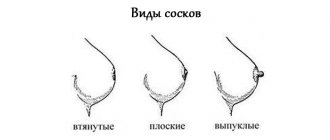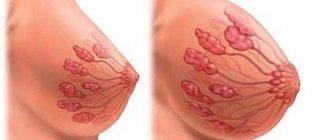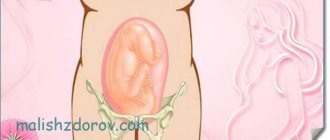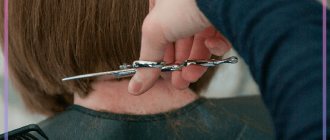Fetus at 21 weeks of gestation: movements, development, weight and size
Indeed, at this stage, both the size and weight of the baby are radically different from the same indicators that were observed just a couple of weeks ago. The baby has grown and become stronger, his movements are becoming more coordinated and noticeable. Now the fetus can sometimes even push inside so that it is noticeable externally: the mother can even sometimes observe how the belly moves in time with the baby’s movements.
There is enough space in the uterus for the fetus to make free movements in its “house”: it bends its arms and legs, swims from the wall of the uterus to its opposite wall. It happens that the biorhythms of the mother and the baby, let’s say, do not coincide very much: the baby begins to persistently and actively declare itself at night, when the woman wants to rest. Calm the baby down: pat his belly, talk to the baby, sing him a lullaby or tell him a fairy tale in a quiet voice. Remember that now the baby clearly perceives sounds coming from outside: excessively loud music or sharp sounds can scare the baby.
The number and intensity of the baby’s movements are now also becoming a kind of “diagnostic” tool, making it possible to determine the degree of comfort for the baby. Thus, excessively active and frequent movements, as well as their prolonged absence, may indicate a lack of oxygen experienced by the fetus.
It is believed that at 21 weeks of pregnancy the baby already makes approximately 200 movements per day. True, the vast majority of them are not felt by the expectant mother, recording only about 15 movements of the baby per day.
At the 21st week of pregnancy, it reaches an average of 26.7 cm, the baby’s weight is about 360 g. But the internal organs of the fetus are growing and improving more and more.
First of all, it is the digestive system. She is actively developing and preparing for full independent functioning. The baby constantly swallows amniotic fluid, which passes through the intestines and is excreted by the rectum. They release water and sugar, which are absorbed by the small organism. These calories are not enough for the baby to live, but the amniotic fluid also contains a number of other nutrients. Enzymes and hydrochloric acid have already appeared in the digestive system, although still in rather minute quantities.
The taste of the baby’s first “food” directly depends on what the mother eats, drinks and smokes. So form the right eating habits and lead a healthy lifestyle.
The endocrine glands are actively functioning: hypothalamus, thyroid gland, adrenal glands, pancreas and gonads. The spleen is connected.
Remember that the muscular and skeletal system of the fetus is strengthened, which means that the need for calcium increases. But be careful with medications: an excess of calcium can lead to premature overgrowth of the fontanel, and this is unacceptable for natural childbirth. Therefore, additional calcium can be taken orally only on the recommendation of a doctor.
Future mom
Your appetite may begin to increase as your baby gains fat and requires additional calories. Eat enough to avoid going hungry, and eat a variety of nutrient-rich foods. However, under no circumstances overeat or overeat at night; keep your weight and allowable gains under control. By 21 weeks of pregnancy, you could have gained an additional 4.5 to 6.5 kg. Calmly accept your bizarre gastronomic desires - a perversion of appetite is quite common during this period.
Do not raise your arms above your head, and if you had to do this, do not keep them in this state for a long time. If colostrum begins to leak from your breasts, do not press under any circumstances. Just stick to hygiene: wash and wipe with sterile wipes, buy breast pads, change your bra to a larger one on time.
Be attentive to vaginal discharge: an exacerbation of thrush is likely. The anus may also bleed if you suffer from hemorrhoids or constipation - this is not dangerous for the baby.
Twenty first week of pregnancy
The skin is smooth, dense, pink. Bone and muscle tissue is built up and strengthened. The esophagus joins in the exercise of the lungs - it processes the amniotic fluid received after swallowing. The work of the endocrine system continues, now the spleen is connected to it.
The brain also continues to develop. The formation of the cortex, new grooves, convolutions occurs, and nerve cells gradually divide. Every movement of the fetus becomes more coordinated than before.
If the mother's body is saturated with a sufficient volume of amniotic fluid, the baby will be able to freely change position - turn upside down or head down, spin around an axis. Phases of movement alternate with periods of deep sleep. Continue to monitor your intensity of movement throughout the day. Atypical activity at week 21 indicates a lack of oxygen. Remember that the fetus, moving chaotically and abruptly, can accidentally become entangled in the umbilical cord. Tell your doctor at our medical center immediately about this.
Risk criteria
During this week you can notice:
- significant weight gain;
- pain in the abdominal muscles;
- change in skin tone;
- intensive hair growth. Moreover, they may appear in an undesirable place;
- haemorrhoids;
- “training” Braxton-Hicks contractions.
Most of the changes described above are not dangerous to the body. However, we recommend that you consult with our doctor to develop a schedule of further actions and a course of medication (if necessary).
The greatest danger to the mother’s body is edema. Blood circulation gradually begins to slow down, as a result of which fluid remains inside the tissues of the legs. It is quite possible that the excess concentration of water inside the body is to blame. Edema does not affect pregnancy if it is localized in the legs. If swelling appears on the face and does not disappear for a long time, this indicates serious complications. It is strictly forbidden to self-medicate - with a high degree of probability you will make things worse for yourself.
Passing the second trimester is associated with an increased risk of thrush. Throughout the 21st week, the body does not cope well with its protective function. If you ignore thrush, it is guaranteed to be passed on to your child.
As for medical supervision, in addition to the routine ultrasound, you will have to undergo screening. If complications are detected, our doctors will prescribe a number of additional studies.
Discharge at 21 weeks of pregnancy
You should still pay attention to the nature and quality of vaginal discharge: normally, the discharge is now somewhat more liquid than before, transparent or light whitish, with a subtle sour odor. Any changes in the nature of the discharge, such as the appearance of yellow or green, purulent, curdled, foamy discharge with an unpleasant odor and accompanying discomfort in the genital area, is a sign of the development of a sexually transmitted infection.
Bloody discharge also poses a danger, as before. By the way, from the 21st week, early termination of pregnancy is no longer considered a miscarriage, but a premature birth - at this stage the baby is able to survive outside the uterus, subject to proper care and the availability of specialized medical equipment.
More on the topic
Fetal development at 12 weeks of pregnancy
Fetal development at 14 weeks of gestation
What to do if you have a small belly during pregnancy and it doesn’t grow?
Ultrasound at 12 weeks of pregnancy
Dimensions of the uterus during pregnancy
A high risk of premature birth is indicated by spotting that appears at 21 weeks of pregnancy. If even minor traces of blood appear on your panties, you should immediately seek medical help: with a timely response, there is a high probability of the pregnancy being extended to its due date.
Similarly, you need to sound the alarm if you experience vaginal discharge in the form of scarlet blood. This picture is typical for pathological complications of pregnancy, such as placental abruption or placenta previa. In both cases, it is impossible to do without the intervention of doctors: these complications are extremely dangerous for pregnancy and the further successful bearing of the baby.
You should also be concerned if liquid, watery discharge appears: perhaps, in this case, there is leakage of amniotic fluid. Amniotic fluid may leak slightly, and then the woman observes the effect of “wet panties.” Or they can “gushing in a flood,” which, in turn, leads to the onset of premature birth. Even if liquid watery discharge - in fact, amniotic fluid - is separated in insignificant small portions, consultation with a doctor is necessary: a violation of the tightness of the membranes within 24 hours leads to intrauterine infection of the fetus.
Feelings of the expectant mother in the twenty-first week of pregnancy
At 21 weeks of pregnancy, a woman is faced with completely new sensations. First of all, she begins to clearly feel the presence of a living being inside her body. As the child's skeleton is already forming, his movements become more and more intense. At the same time, at 21 weeks he has not yet reached a large size, so he fits perfectly in the uterus and can still tumble and flip, delighting his mother.
Often the child behaves very actively, especially at night, not allowing the woman to get a full night's sleep. These temporary difficulties usually do not upset women, but on the contrary, give them a lot of positive emotions. After all, it is precisely by feeling her baby alive that the expectant mother feels the greatest connection with him.
It is worth remembering that active manifestations of fetal activity during this period of time are the norm. If there is no movement at 21 weeks of pregnancy, you need to consult a specialist. Such a sign may indicate abnormal development of the fetus and even its death. If the child was active and suddenly calmed down for several hours or days in a row, it is recommended to undergo an ultrasound.
You should also be wary if your stomach hurts in the twenty-first week of pregnancy. Particularly dangerous are cramping pains in the lower part, indicating increased tone of the uterus.
Unpleasant symptoms of 21 weeks include:
- shortness of breath, which is observed due to compression of the lungs by the growing uterus;
- frequent urge to urinate, also due to the large size of the uterus;
- nipple discharge. This is colostrum, which means that the body is preparing for childbirth and the subsequent feeding of the baby with milk;
- slight vaginal discharge. Discharge at 21 weeks of pregnancy should be transparent, not
- accompanied by an unpleasant odor and itching in the genital area;
- general deterioration in health, heaviness in the body;
- sleep disturbances caused by a woman’s worries, fears, and emotional state.
Some expectant mothers experience an increase in libido during this period of time. Sexual relations are contraindicated only in case of threat of miscarriage.
Pain
The 21st week of pregnancy can be distinguished by the appearance of a wide variety of pains that arise due to the body being thoroughly “adapted” for bearing and further birth of a child.
It is likely that now you will experience pain in your navel and a feeling of pressure on your stomach in this area from the inside. The fact is that the uterus has now reached just such a standing height at which it begins to put pressure on the navel. As pregnancy progresses, when the uterus passes this section of the path, the pain in the navel and the feeling of pressure on it will go away on its own.
The weight that has increased over the previous time also causes significant stress on the legs and, in particular, the knee joints. It is not surprising that at the end of the day a woman may experience pain in her legs, and at night wake up from cramps in her legs. By the way, cramps during this period are also a consequence of the increased need and, probably, lack of calcium in the pregnant woman’s body, which is now consumed to the maximum by the growing fetus. To reduce problems associated with pain and fatigue in the legs, and to avoid cramps, it is advisable to increase your dietary intake of calcium-containing foods, and also give your legs a rest regularly throughout the day. Stay in a standing position less, when sitting down, do not cross your legs, taking a horizontal position - raise your legs to a height, for example, on the cushion of a sofa. It is good to massage your legs and feet in the evenings, and take warm foot baths with the addition of a decoction of soothing herbs.
As your weight increases, the stress on your spine and lower back will increase. To avoid back pain, avoid prolonged walking and sitting, do not sit on chairs without a backrest, learn to get out of bed correctly (first lower your legs to the floor, and only then get up yourself), lift and carry heavy objects: it is better to distribute the load equally in two hands, and bending down, slightly spread your legs to the sides and sit down, bending them at the knees; If you lift something heavy, distribute the load across your buttocks, hips and shoulders.
Belly at 21 weeks of pregnancy: tugs, hurts
And, of course, one of the most annoying, and in some cases dangerous, can be abdominal pain at 21 weeks of pregnancy. Most often, episodic abdominal pain by this time is not a pathology. This is if we are talking about pain localized on the sides (or one side) of the abdomen and occurring from time to time (more often when rising from a sitting or lying position, when turning the body, while coughing or sneezing). Such pain is a consequence of tension in the ligaments that hold the uterus, which stretch as the uterus grows. The pain occurs spontaneously, similar to a pulling or stabbing sensation, but also passes just as quickly.
If at 21 weeks of pregnancy the stomach feels tight, hurts, or a cramping pain appears “located” in the lower abdomen, there is a risk that it is associated with increased tone of the uterus. Such pain can radiate to the lower back - with increased tone of the uterus, painful sensations seem to ring the woman, starting from the abdomen and continuing to the lower back. You should not ignore such pain: hypertonicity of the uterus is a direct path to premature birth. Therefore, it makes sense to immediately consult a specialist immediately upon the appearance of such pain, which does not go away within 1-2 hours.
Treatment methods for nagging pain
In case of pathological pain in a pregnant woman, a medical consultation may be required to solve the problem. Here, doctors determine what kind of therapy is required: they compare the risks, select safe medications aimed at eliminating the causes and symptoms of a particular disease.
Sometimes decisions need to be made on an emergency basis: removal of appendicitis, combating intestinal obstruction, surgery to eliminate a ruptured cyst, and other cases. Then the main goal of doctors is to save the woman’s life.
If the symptoms are not associated with acute or chronic diseases, antispasmodics are required: Drotaverine, Papaverine. For spasms and tone, hormonal medications, Magnesium B6 and some other medications may be prescribed. However, they must be taken strictly according to the doctor's instructions.
Nagging abdominal pain at 21 weeks of pregnancy requires the woman’s attention. It is important to monitor the condition and note any additional symptoms. If they become stronger, you need to contact an ambulance or make an appointment with a gynecologist.
Ultrasound at 21 weeks of pregnancy
If your pregnancy has been going well from the very beginning, you will most likely be scheduled for a second scheduled ultrasound examination at 21 weeks. During which the doctor will be able to tell you whether the baby is developing normally and whether there are any threats to the pregnancy and fetus. In addition, if the child turns the “right side” during the ultrasound, the specialist will be able to tell mom and dad the gender of the baby. However, keep in mind that there is a small percentage of mistakes: it happens that an ultrasound at 21 weeks shows, for example, that parents can prepare for the birth of a boy, and a few months later in the maternity hospital the mother finds out that the family has been expanded with a daughter.
But not only, and not so much, gender determination becomes the main purpose of ultrasound at 21 weeks of pregnancy. Still, its main task is to assess the condition of the fetus and the degree of its development, exclude possible congenital pathologies, and examine the uterus. So, during an ultrasound, the doctor will evaluate the internal organs of the fetus and the ratio of body size to gestational age. The baby's motor activity will be assessed and his heartbeat will be listened to.
The condition of the uterus will also be a subject of interest: its size and relationship with the size of the child, the condition of the myometrium, the place of attachment of the placenta, the condition of the amniotic fluid.
Especially for beremennost.net – Elena Kichak
How to distinguish a boy and a girl on an ultrasound at 21 weeks
Experts can determine with a high probability the sex of the child starting from the 11th week of pregnancy. This can be done using a painless ultrasound procedure.
During an ultrasound at 21 weeks, the doctor can most confidently tell the expectant mother the sex of her baby. The differences between a boy and a girl at this stage of development are more noticeable, but only a specialist can determine them, only when the child is in a certain position. In an ultrasound image, such differences are almost invisible.
Modern research methods do not yet allow us to determine with 100% certainty the sex of a child before birth.











